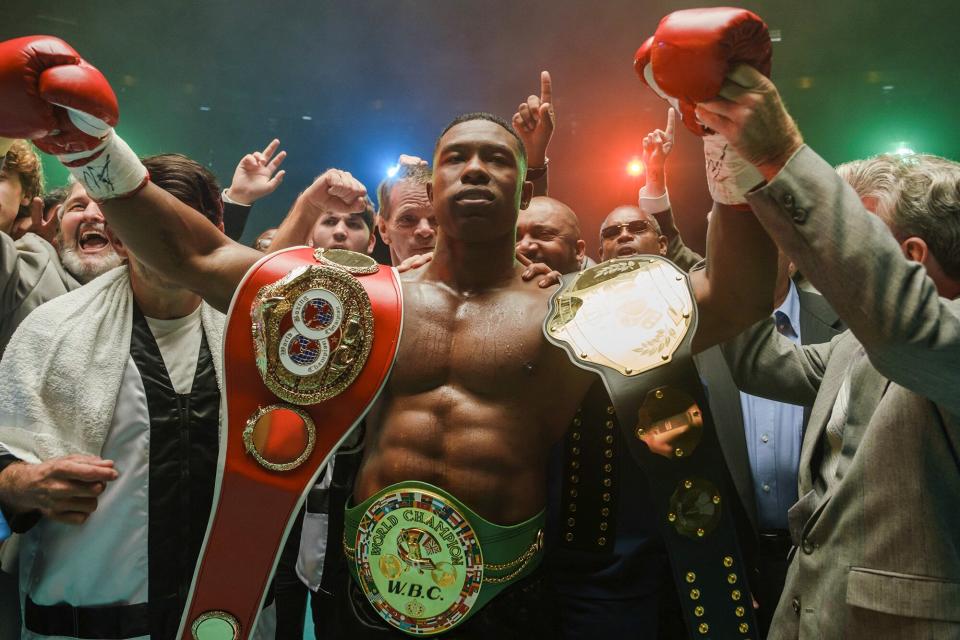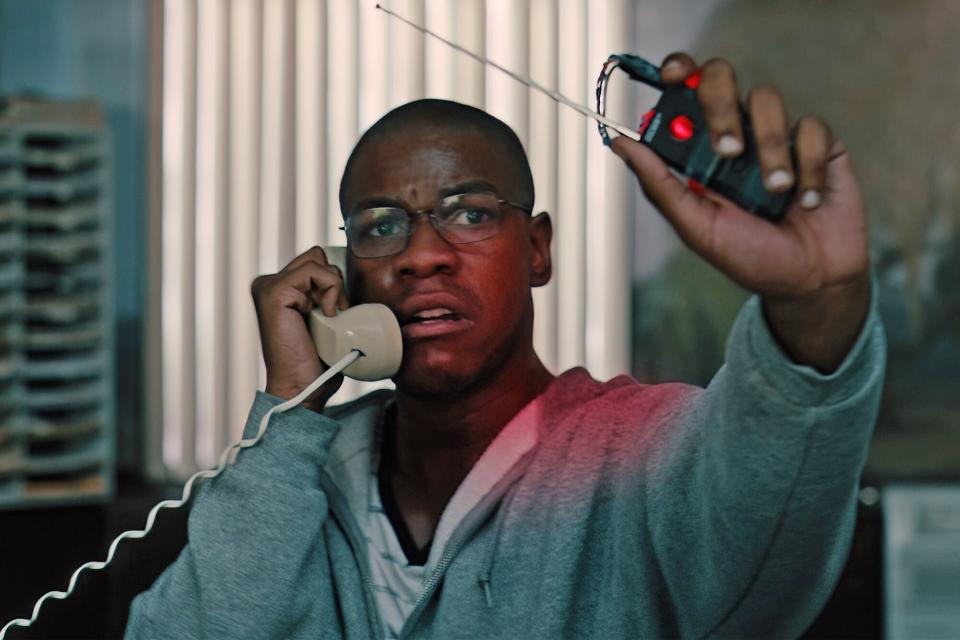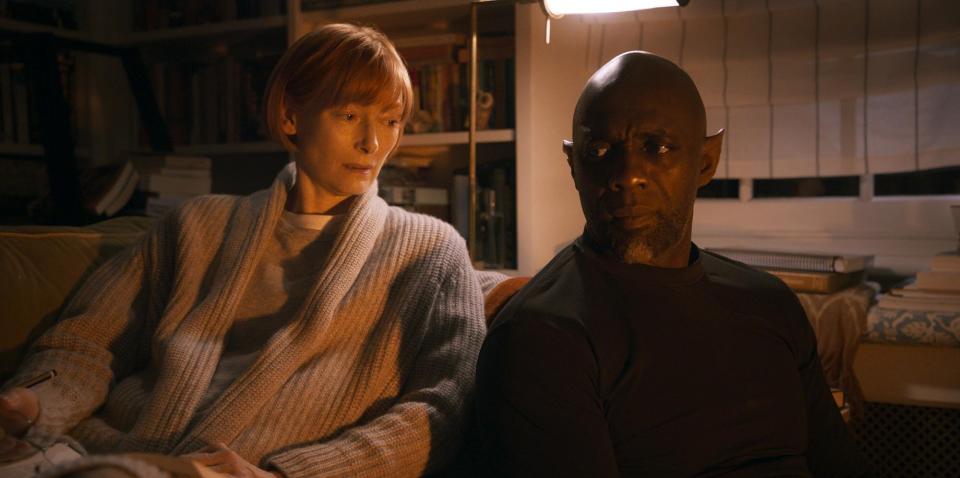Mike takes unsuccessful jab at Tyson's story, but John Boyega is a knockout in Breaking

- Oops!Something went wrong.Please try again later.
Mike
Streaming Thursdays on Hulu

Patti Perret/Hulu Trevante Rhodes in 'Mike'
Hulu's 8-episode Mike portrays Mike Tyson's life as a blitzkrieg of incidents: Fists, bullets, butts, money, blood, cheers, a jury, Barbara Walters, a hot tub in a limo. These events get extra-eventized with a style I like to call Stupid Scorsese, all frantic music montages and ironic ultraviolence sandwiching smirking narration and broken fourth walls. It's the same hysterical-biopic mentality creator Steven Rogers brought to I, Tonya — and Mike reunites Rogers with Tonya director Craig Gillespie, who has not met a popular song he won't cinematically beat to death.
Trevante Rhodes (Moonlight, Bird Box) stars as the heavyweight champion, who guides us through the last half-century of Mike-ness via a one-man stage show that intercuts with notorious setpieces from throughout his life. Rhodes' impression is serviceable and surface, approximating the boxer's falsetto without remotely nailing his teddy-bear-cannibal magnetism. The first four episodes observe his rise from Brownsville poverty to global glory. Shock value and headlines matter more than authenticity. More emotional weight is given to Tyson's removal from Nintendo's Punch-Out than to the death of his sister. And Mike is notably lightweight on the sweet science: Harvey Keitel's Cus D'Amato screams mottos ("Fight your mind!" "Be a gladiator!") but the show never lets you really understand what made Tyson so good in the ring.
Tyson himself has criticized the biopic, which is his right, just like it's the right of the creators to produce an (awful) biopic about public figures to grab any viewers desperate for controversy nostalgia. The depiction of the troubled marriage to Robin Givens (Laura Harrier) feels less like a bad '90s TV movie with streaming content (nudity and drugs!) added in. The fifth part is something else entirely, with a perspective shift that narrows the focus to Tyson's 1992 rape trial. The episode aims for sensitivity, but can't square its own circle: It's a story about not defining a woman as a celebrity's victim, which occupies precisely 1/8th of the narrative real estate in clickbait TV series about said celebrity. Look, all of these celebrity biopics are bad. Please stop making them, television. C- —Darren Franich
Breaking
In theaters now

BLEECKER ST John Boyega in 'Breaking'
John Boyega, the young British actor who dared to look a Star Wars gift horse in the mouth, has been unusually open about the destabilizing effect of signing on to a career-eating franchise. In that context, his recent pivot to more human-scale projects like Breaking, a low-key thriller–cum–character study rich with non-green-screen possibility, makes perfect sense: He's been great, really, since his teenage debut in 2011's scrappy alien-invasion indie Attack the Block, and he's immensely watchable in the fact-based story of Brian Brown-Easley, a Marine veteran who held up a Georgia bank in 2017, even when the material here doesn't always rise to meet him.
Director Abi Damaris Corbin stages her script (co-written with Kwame Kwei-Armah) like a bottle episode with a jittery docudrama feel, plunging Boyega's Brian almost directly into his defining act. After tours of duty in Iraq, he's got almost nothing to show for his service beyond an estranged ex-wife, a daughter he can barely afford to call on a prepaid cell, and an indifferent shrug from the VA administrators who have misfiled his monthly payments. It's not a long leap from there to his own Dog Day Afternoon, when he walks into a Wells Fargo and slides the teller (Orange Is the New Black's Selenis Leyva) a note. Soon it's down to just the two of them and bank manager Estel (Nicole Beharie) on the inside, and a local news producer (Connie Britton) and hostage negotiator (the late Michael K. Williams, in one of his last screen performances) calling in.
What follows, as Brian reveals himself in bits and pieces to his two terrified hostages and whoever else will listen — he's desperate for someone, anyone to acknowledge the government's gross indifference — turns out to be a showcase mostly for Boyega and Beharie, whose tense, delicate interplay makes up much of the movie's emotional core. They're both Black single parents fiercely determined to do right by their kids, caught up in circumstances that have put those shared goals diametrically at odds, and the actors work intuitively not to overplay that fraught dynamic; Brian is caught up in a system explicitly designed to erase and ignore and define him at the same time, and he's acutely aware of it. Breaking is at its best when it allows the story just to sit in those moments, and give the real Brown-Easley something he never got in life: not justice maybe, but the chance to be finally, sympathetically seen. Grade: B —Leah Greenblatt
Three Thousand Years of Longing
In theaters now

MGM Tilda Swinton and Idris Elba in 'Three Thousand Years of Longing'
A man cannot live on Thunderdomes alone. Somewhere between the twinned dystopias of 2015's Mad Max: Fury Road and its upcoming prequel Furiosa, due in 2024, director George Miller must have felt the urge for a palate cleanser; the result is Three Thousand Years of Longing, a glossy cinematic knickknack steeped in the heady unreality of a fable or a waking dream.
Even its casting feels like Mad Libs: Tilda Swinton is Alithea Binnie, a London narratologist; Idris Elba is the immortal djinn she meets when she goes to an academic conference in Turkey and finds herself drawn to an unassuming glass bottle at a marketplace stall. She is, she insists primly, "adequately happy alone": no parents, no children, no partner. So when a house-sized Elba emerges in a hurricane swirl, offering three wishes — anything, her heart's desire! — she presumes it can only be a trick, and demands to know his provenance.
Elba's djinn, his elfin ears flocked and palms dusted in fuchsia and gold, obliges, recounting centuries of misadventure and thwarted attempts to gain his freedom, from the Queen of Sheba to a young slave girl, a rampaging sultan and a trapped trophy wife. Fantastical bits of flair abound — the candy-colored sheen on a horse's mane, a tiny Einstein scaled to fit in the palm of a hand — and Miller's camera swoops and dips like it's been strapped to an eagle's back. It's all jumpy and surreal and frankly carnal, like Aladdin for adults, or a swords-and-sandals epic recast by Guillermo del Toro.
It's the Longing in the title, though, that the director keeps coming back to — the enduring loneliness of his two main protagonists (one adrift for at least half a lifetime, the other for several millennia more) and their strange, cosmic courtship dance. In that sense, the film's tone and its intended audience never quite come into focus. It's a gentler, sadder movie than the dizzying trailer suggests, and less driven by plot than a stickler for storytelling like Alithea might prefer: a loopy little jewel-box reverie, slipped between two Furies. Grade: B —Leah Greenblatt
Related content:

